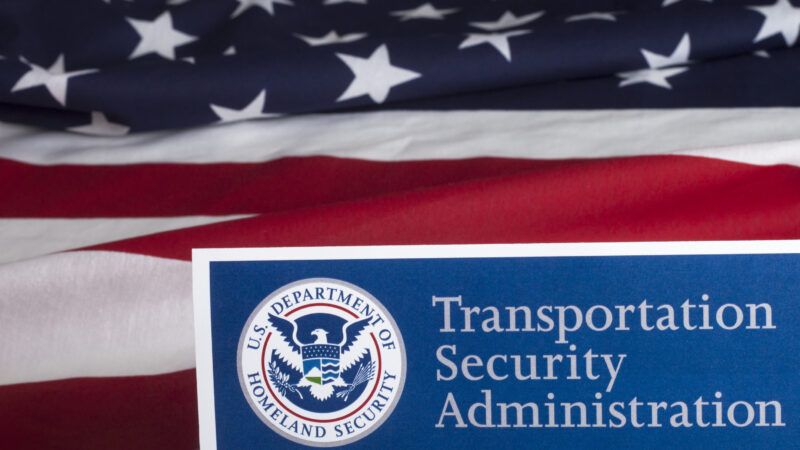21 Years After 9/11, TSA Still Insists on Grabbing Your Dick When You Fly
The Transportation Security Administration is one of the more useless, invasive appendages of the post-9/11 security state. It’s well past time to get rid of it.

Twenty-one years on from the destruction of the Twin Towers, it's becoming possible to tell which parts of the post-9/11 security state were passing expediencies or flashes of paranoia, and which have become institutionalized parts of American life.
Last year's withdrawal from Afghanistan suggests large-scale regime change wars with lots of American boots on the ground are over for now. The Biden administration, for all its foreign policy faults, has drastically wound down overseas drone strikes. Perhaps those too will become a relic of a darker time.
Many more elements of the War on Terror bureaucracy have become permanent, accepted features of American life. That would include the most visible, intrusive, and useless of them all: the Transportation Security Administration (TSA).
Created just two short months after the 9/11 attacks, the TSA nationalized a largely privatized, decentralized system of airport security that existed previously and replaced it with the federalized behemoth we know today.
It brought with it many of the things people hate most about airports: long lines, forced shoe removal, and dour government agents giving you the third degree for carrying too much toothpaste.
I got a good reminder of the TSA's many excesses just yesterday when going through one of the agency's once-controversial full-body scanners.
As I stepped out of the Orwellian picture booth in the Nashville airport, I was told that the machine had issued a "groin alert" and that I'd have to receive the requisite pat down.
A TSA agent took me aside and explained in minute detail all the places his hands and fingers would have to go—all, I guess, in an effort to reassure me that the coming molestation was all above board (legally, if not literally).
Having a gloved federal employee whisk his hands around your waistline and pat down your genitals provokes an interesting range of emotions—none of them particularly positive. It's an experience that's humiliating for the searched, and degrading for the searcher.
The agent's inspection produced no weapons or contraband of course. It didn't even produce an apology.
Perhaps TSA agents are worried that offering a simple "sorry" after conducting an unnecessary search might raise awkward questions about how often scanning machines that process 2 million people a day raise these false alarms.
They needn't worry. America seems to have convinced itself that treating every member of the flying public like a potential terrorist is a totally normal part of air travel.
Gone is the shock and horror that TSA agents "saw you naked." The agency's old foes in the civil libertarian left and populist right have largely moved on to other pressing issues. Travel-sized shampoos and Pre-Check have made some of the most annoying elements of our airport security regime less so.
Still, nothing has changed about the uselessness of the TSA.
The agency misses as much as 70 percent of the fake bombs, guns, and explosives that undercover government auditors try to sneak through their security checkpoints. Surveyed passengers report a near-90 percent success rate at getting illicit substances and items through security.
Improved safety obviously isn't the reason the agency is still around. Nor can its continued existence be explained by its employees' love of the job. The TSA ranks close to the bottom of all government agencies in terms of employee pay, morale, and turnover.
Perhaps the only thing keeping it alive is shamelessness. The TSA's media arm takes every possible opportunity to remind people of the tragedy of 9/11. The implication is clear: if you eliminate us, the events of that day could happen again.
TSA Federal Security Director Csontos has a vivid memory of 9/11 working as a K9 handler with the Connecticut State Police. Learn more about his experience at Ground Zero and why he continues to serve today: https://t.co/7xC8t2KpZr #NeverForget pic.twitter.com/LyYUNc48eM
— TSA (@TSA) September 9, 2022
Hardly. Its track record suggests we could safely eliminate the agency and its onerous security checkpoints without any heightened risk of terrorism.
The flying public would reclaim a little privacy and decency. Taxpayers would save a little money. TSA employees would get the nudge they need to leave a job they probably hate. It's a win-win-win for America.
Come November, the TSA will celebrate its 21st birthday. So let's buy them a drink of fewer than 3.4 ounces and wish they don't turn 22.
Rent Free is a weekly newsletter from Christian Britschgi on urbanism and the fight for less regulation, more housing, more property rights, and more freedom in America's cities.


Show Comments (314)